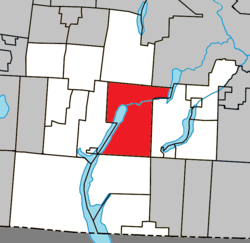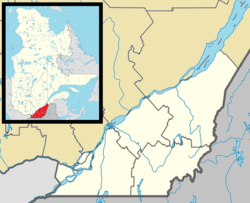Magog (locally /ˈmeɪɡɔːɡ/ MAY-gawg, French: [maɡɔɡ]) is a city in southeastern Quebec, Canada, about 120 kilometres (75 mi) east of Montreal at the confluence of Lake Memphremagog—after which the city was named—with the Rivière aux Cerises and the Magog River. It is a major centre and industrial city in the Regional County Municipality of Memphremagog. The city lies in the Eastern Townships tourist region.
Magog | |
|---|---|
 The skyline of the city of Magog | |
| Motto(s): Fidelitate et Labore(Latin) "Through faithfulness and labour" | |
 Location within Memphrémagog RCM | |
| Coordinates: 45°16′N 72°09′W / 45.267°N 72.150°W[1] | |
| Country | Canada |
| Province | Quebec |
| Region | Estrie |
| RCM | Memphrémagog |
| Constituted | October 9, 2002 |
| Government | |
| • Mayor | Nathalie Pelletier |
| • Federal riding | Brome—Missisquoi |
| • Prov. riding | Orford |
| Area | |
• City | 167.50 km2 (64.67 sq mi) |
| • Land | 144.19 km2 (55.67 sq mi) |
| • Urban | 19.57 km2 (7.56 sq mi) |
| Population (2011)[4] | |
• City | 25,358 |
| • Density | 175.9/km2 (456/sq mi) |
| • Urban | 22,222 |
| • Pop 2006–2011 | |
| • Dwellings | 13,605 |
| Time zone | UTC−5 (EST) |
| • Summer (DST) | UTC−4 (EDT) |
| Postal code(s) | |
| Area code(s) | 819 and 873 |
| Highways | |
| Website | www |
In 2002, the City of Magog was merged with the Township of Magog and the Village of Omerville as part of the municipal reorganization in Quebec.
Etymology
edit"Memphremagog" comes from the Abenaki word mamhlawbagak, which means "large expanse of water" or "vast lake."[5] "Magog" is believed to be a truncation of the lake's name. However, it could also come from namagok and namagwôttik, which means "the lake where there is brook trout." Others have theorised that the name has Biblical origins in Gog and Magog, or that it refers to an ancient city by the same name.[1]
History
editThis section needs expansion with:
|
The Abenaki were the first to inhabit the region[citation needed] and had long visited the Memphremagog and its waterways.[5] White settlement began in 1776, when Loyalists emigrated from nearby Vermont. They called it The Outlet, referring to the flow of water emptying into the Magog River from the lake.[citation needed]
Ralph Merry, who is considered the founding father of Magog, was an American Revolutionary who immigrated to Lower Canada in 1799 and settled in Bolton, to the west of the lake. He bought up all the neighbouring lots, including The Outlet village, where he went on to act as its mayor, judge, and developer. In 1821, he built a house there, which is the oldest standing house in the city.[6]
It was formally named Magog in 1855.
At the end of the 19th century and throughout the 20th, the city's economy was dominated by the textile industry, most notably by a cotton mill operated by Dominion Textile. It was only in the 1960s and the 1970s that the city's economy would achieve desperately needed diversification through tourism, services, and the development of an industrial park.[7]
In 2002, the City of Magog was merged with the Township of Magog and the Village of Omerville as part of the municipal reorganization in Quebec.
Notable people
edit- Rouville Beaudry, Quebec nationalism activist who served in the Legislative Assembly of Quebec[8]
- Pierre Bélanger, volleyball player who competed in the 1976 Olympics[9]
- Nicolas Boulay, Canadian Football League player[10]
- Reginald W. Buzzell, U.S. Army brigadier general, born in Magog[11]
- Sonia Vachon, actress[12]
Geography
editMagog is a city in southeastern Quebec, Canada, about 120 kilometres (75 mi) east of Montreal at the confluence of Lake Memphremagog, the Rivière aux Cerises, and the Magog River. The city of Magog is also in close proximity, 35 km (21.8 mi), to the Derby Line–Stanstead border crossing station at the Canada-United States border.[13]
Climate
edit| Climate data for Magog | |||||||||||||
|---|---|---|---|---|---|---|---|---|---|---|---|---|---|
| Month | Jan | Feb | Mar | Apr | May | Jun | Jul | Aug | Sep | Oct | Nov | Dec | Year |
| Record high °C (°F) | 17 (63) |
15 (59) |
24 (75) |
29 (84) |
33.9 (93.0) |
33 (91) |
34.4 (93.9) |
33.3 (91.9) |
30.6 (87.1) |
27.2 (81.0) |
22.8 (73.0) |
18 (64) |
34.4 (93.9) |
| Mean daily maximum °C (°F) | −5.9 (21.4) |
−4 (25) |
1.7 (35.1) |
9.3 (48.7) |
17.5 (63.5) |
22.1 (71.8) |
24.5 (76.1) |
23.2 (73.8) |
18 (64) |
11.4 (52.5) |
3.9 (39.0) |
−2.7 (27.1) |
9.9 (49.8) |
| Daily mean °C (°F) | −10.4 (13.3) |
−8.8 (16.2) |
−2.8 (27.0) |
4.6 (40.3) |
12 (54) |
16.9 (62.4) |
19.4 (66.9) |
18.2 (64.8) |
13.3 (55.9) |
7.1 (44.8) |
0.5 (32.9) |
−6.7 (19.9) |
5.3 (41.5) |
| Mean daily minimum °C (°F) | −14.9 (5.2) |
−13.5 (7.7) |
−7.3 (18.9) |
−0.1 (31.8) |
6.4 (43.5) |
11.7 (53.1) |
14.3 (57.7) |
13.2 (55.8) |
8.6 (47.5) |
2.9 (37.2) |
−2.9 (26.8) |
−10.7 (12.7) |
0.6 (33.1) |
| Record low °C (°F) | −37.2 (−35.0) |
−38 (−36) |
−31.7 (−25.1) |
−17.2 (1.0) |
−6.1 (21.0) |
−2 (28) |
2 (36) |
0.6 (33.1) |
−5 (23) |
−8.9 (16.0) |
−20.6 (−5.1) |
−32.2 (−26.0) |
−38 (−36) |
| Average precipitation mm (inches) | 86.5 (3.41) |
62 (2.4) |
80.2 (3.16) |
81.7 (3.22) |
100.3 (3.95) |
110.4 (4.35) |
120.2 (4.73) |
120 (4.7) |
97.8 (3.85) |
95.6 (3.76) |
92.3 (3.63) |
87.6 (3.45) |
1,134.5 (44.67) |
| Source: Environment Canada[14] | |||||||||||||
Demographics
editIn the 2021 Census of Population conducted by Statistics Canada, Magog had a population of 28,312 living in 13,439 of its 15,009 total private dwellings, an increase of 6.2% from its 2016 population of 26,669. With a land area of 144.26 km2 (55.70 sq mi), it had a population density of 196.3/km2 (508.3/sq mi) in 2021.[15]
Population trend:[16]
| Census | Population | Change (%) |
|---|---|---|
| 2011 | 25,358 | 6.2% |
| 2006 | 23,880 | 6.0% |
| Merger | 22,535 (+) | 58.00% |
| 2001 | 14,283 | 1.7% |
| 1996 | 14,050 | 0.1% |
| 1991 | 14,034 | N/A |
(+) Merged with the Township of Magog and the Village of Omerville on October 9, 2002.
Mother tongue (2011)[4]
| Language | Population | Pct (%) |
|---|---|---|
| French only | 22,975 | 92.2% |
| English only | 1,390 | 5.6% |
| Both English and French | 255 | 1.0% |
| Non-official languages | 270 | 1.1% |
| French and non-official language | 20 | 0.08% |
| English and non-official language | 5 | 0.02% |
| English, French and non-official language | 5 | 0.02% |
Economy
editThis section needs expansion with: material from the French article. You can help by adding to it. (July 2014) |
The city is the economic core of the Regional County Municipality of Memphremagog.
Industry
editFor several generations, it was a one-industry (textile) manufacturing town, where Dominion Textile made cotton goods. The main plant is still there. However, the plant has considerably reduced its activities to a few employees, who mainly making pillows.
Tourism
editMagog is in a resort area, with shops and services catering to vacationers and tourists. Tourism is related to the lake and the nearby Mount Orford.
See also
editReferences
edit- ^ a b "Banque de noms de lieux du Québec: Reference number 133621". toponymie.gouv.qc.ca (in French). Commission de toponymie du Québec.
- ^ a b "Ministère des Affaires municipales, des Régions et de l'Occupation du territoire: Magog". Archived from the original on 2011-12-27. Retrieved 2012-03-11.
- ^ "Parliament of Canada Federal Riding History: BROME--MISSISQUOI (Quebec)". Archived from the original on 2009-06-09. Retrieved 2009-05-01.
- ^ a b c 2011 Statistics Canada Census Profile: Magog, Quebec
- ^ a b "Banque de noms de lieux du Québec: Reference number 40463". toponymie.gouv.qc.ca (in French). Commission de toponymie du Québec.
- ^ "La Maison Merry de Magog" (in French). Magog Historical Society. 26 June 2013. Retrieved 13 July 2014.
- ^ "L'industrie textile : un fil conducteur de l'histoire magogoise" (in French). Magog Historical Society. 12 March 2009. Retrieved 13 July 2014.
- ^ "Rouville Beaudry, Quitting as M.L.A., Attacks N.U. Rule". The Gazette. Montreal, Quebec, Canada. October 21, 1938. p. 1 – via Newspapers.com.
- ^ Binkley, Alex (February 25, 1976). "National Volleyball: Men Stepping Out Of Shadows". The Golden Star. Golden, British Columbia, Canada. p. 9 – via Newspapers.com.
- ^ Ottawa Redblacks (February 13, 2019). "Welcome to R Nation: Nicolas Boulay". Ottawa Redblacks.com. Ottawa, Ontario, Canada.
- ^ "Gen. Buzzell Dead at 64". Bennington Evening Banner. Bennington, VT. January 23, 1959. p. 1 – via Newspapers.com.
- ^ "Biography, Sonia Vachon". TV Guide.com. Indian Land, SC: Red Ventures. Retrieved September 15, 2021.
- ^ "Magog to U.S. Customs and Border Protection - Derby Line Port of Entry". Google Maps. Retrieved 23 June 2020.
- ^ Environment Canada Canadian Climate Normals 1971–2000, accessed 23 July 2010
- ^ "Population and dwelling counts: Canada, provinces and territories, and census subdivisions (municipalities), Quebec". Statistics Canada. February 9, 2022. Retrieved August 29, 2022.
- ^ Statistics Canada: 1996, 2001, 2006, 2011 census
External links
edit- Media related to Magog, Quebec at Wikimedia Commons

